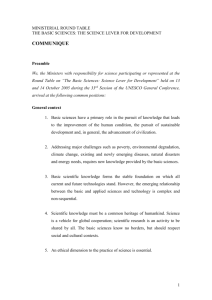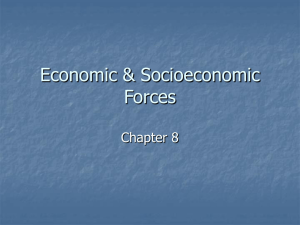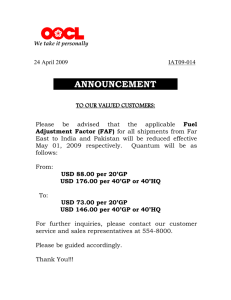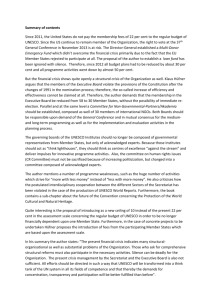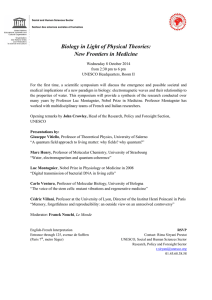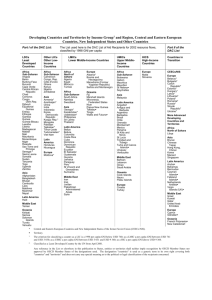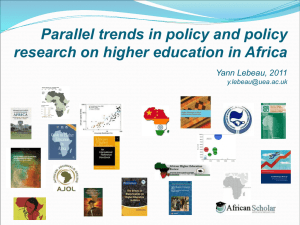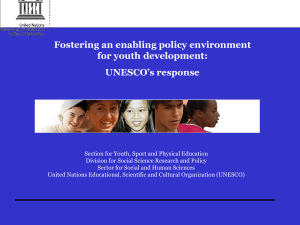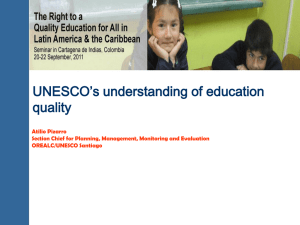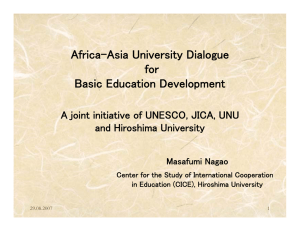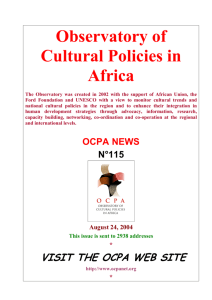Why Open Access can change science in the developing world
advertisement
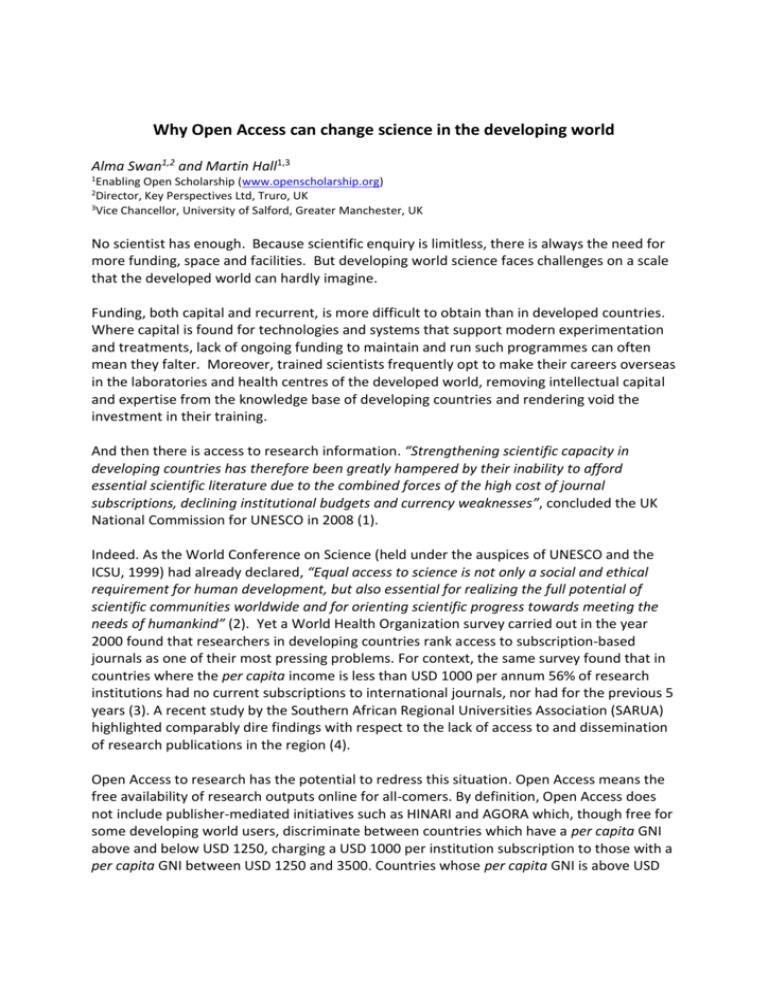
Why Open Access can change science in the developing world Alma Swan1,2 and Martin Hall1,3 1 Enabling Open Scholarship (www.openscholarship.org) Director, Key Perspectives Ltd, Truro, UK 3 Vice Chancellor, University of Salford, Greater Manchester, UK 2 No scientist has enough. Because scientific enquiry is limitless, there is always the need for more funding, space and facilities. But developing world science faces challenges on a scale that the developed world can hardly imagine. Funding, both capital and recurrent, is more difficult to obtain than in developed countries. Where capital is found for technologies and systems that support modern experimentation and treatments, lack of ongoing funding to maintain and run such programmes can often mean they falter. Moreover, trained scientists frequently opt to make their careers overseas in the laboratories and health centres of the developed world, removing intellectual capital and expertise from the knowledge base of developing countries and rendering void the investment in their training. And then there is access to research information. “Strengthening scientific capacity in developing countries has therefore been greatly hampered by their inability to afford essential scientific literature due to the combined forces of the high cost of journal subscriptions, declining institutional budgets and currency weaknesses”, concluded the UK National Commission for UNESCO in 2008 (1). Indeed. As the World Conference on Science (held under the auspices of UNESCO and the ICSU, 1999) had already declared, “Equal access to science is not only a social and ethical requirement for human development, but also essential for realizing the full potential of scientific communities worldwide and for orienting scientific progress towards meeting the needs of humankind” (2). Yet a World Health Organization survey carried out in the year 2000 found that researchers in developing countries rank access to subscription-based journals as one of their most pressing problems. For context, the same survey found that in countries where the per capita income is less than USD 1000 per annum 56% of research institutions had no current subscriptions to international journals, nor had for the previous 5 years (3). A recent study by the Southern African Regional Universities Association (SARUA) highlighted comparably dire findings with respect to the lack of access to and dissemination of research publications in the region (4). Open Access to research has the potential to redress this situation. Open Access means the free availability of research outputs online for all-comers. By definition, Open Access does not include publisher-mediated initiatives such as HINARI and AGORA which, though free for some developing world users, discriminate between countries which have a per capita GNI above and below USD 1250, charging a USD 1000 per institution subscription to those with a per capita GNI between USD 1250 and 3500. Countries whose per capita GNI is above USD 3500 pay the normal subscription rate, however relatively poor they are: Brazil and India, for example, do not qualify for these schemes, despite their developing country status. Open Access can be provided by authors making their papers available through their institutional digital repository or publishing them in Open Access journals, publications that make their content freely available online. The former route, especially, is achievable at very low cost, and special schemes for developing countries help even further (5). The growing network of repositories (currently approaching 1700), with their contents indexed by Web search engines including Google Scholar, is now forming a global database of openly available research. To encourage this development, many research funders around the world, including national research councils and medical charities, now insist that the work they fund is made Open Access by their grant-holders and many universities and research institutions do the same1. As well as providing access for developing world researchers, Open Access also does the corollary – it provides these same scientists with a shop window for their work. The ‘traditional’ scholarly publishing system has been heavily weighted in favour of the developed world and established quality indicator systems accentuate this, depriving developing country science literature of its rightful place. Open Access levels the field. This should in time play out as an economic benefit to the developing world. Dr Blade Nzimande, South Africa’s Minister for Higher Education, in a speech to the 2009 World Conference on Higher Education, drew a distinction between the knowledge societies of the developed world and those of the African continent2. Specifically, he said that the former are producers of knowledge and the latter are consumers. Open Access will change this, enabling the developed world to discover and consume easily – for the first time – the scientific knowledge created by the developing world. True, and equitable, knowledge economies will be fostered across the world, not just in privileged parts of it. Open Access is simple in principle but not in practice. Many researchers remain locked into the customs and practices of traditional ways of disseminating their work. Those new to the concept of Open Access are nervous about adopting new practices and fearful of change. Yet, in the age of the Internet which has forced so many changes on societies around the world, the one that will lead to a freeing up of the scholarly literature is not only inevitable but desirable and optimal. Most scientific journals recognise this and accommodate demands for a free-to-use literature by permitting authors to disseminate their work through their institutional repository. Research funders and universities recognise it too and are implementing mandatory policies on Open Access accordingly. Researchers who have already adopted the Open Access habit 1 See the Registry of Open Access Repository Material Archiving Policies (ROARMAP): http://www.eprints.org/openaccess/policysignup/ 2 http://www.education.gov.za/dynamic/dynamic.aspx?pageid=306&id=8720 are reaping rewards in terms of increased visibility of their work, greater usage and higher impact. The next few years will bring greater growth in Open Access as researchers come to appreciate the benefits of a more efficacious way of disseminating their work. We can also expect funder and institutional policies to continue to grow in number as they have in the recent past (from 1 in 2003 to the almost-170 we have today). Some nations, such as the UK, Australia, Austria, Sweden and Canada, have mandatory Open Access policies covering virtually all publicly funded research and, if passed, the bill currently being discussed in the US Congress will ensure that American research follows suit. 1. UNESCO (2008) Improving Access to Scientific Information for Developing Countries: UK Learned Societies and Journal Access Programmes. Report by Improving Access to Scientific Information Working Group (Natural Sciences Committee) http://www.unesco.org.uk/uploads/Improving%20Access%20to%20Scientific%20Informatio n%20-%20May%2008.pdf 2. UNESCO and the International Council of Scientific Unions (1999): World Conference on Science; Declaration on Science and the Use of Scientific Knowledge (July 1). http://www.unesco.org/science/wcs/eng/declaration_e.htm. 3. Aronson, B (2004) Improving Online Access to Medical Information for Low-income Countries. New England J. Medicine 350, pp. 966–968. http://content.nejm.org/cgi/content/full/350/10/966 4. Abrahams, L, Burke, M, Gray, E & Rens, A (2008). Opening access to knowledge in Southern African universities. In SARUA 2008 Study Series, Southern African Regional Universities Association, Johannesburg, http://www.sarua.org/?q=content/opening-accessknowledge-southern-african-universities 5. Kuchma, I. (2008) Open Access Institutional Repositories in Developing and Transition Countries: Results of eIFL.net Activities. In: Third International Conference on Open Repositories 2008, 1-4 April 2008, Southampton, United Kingdom. http://pubs.or08.ecs.soton.ac.uk/81/
